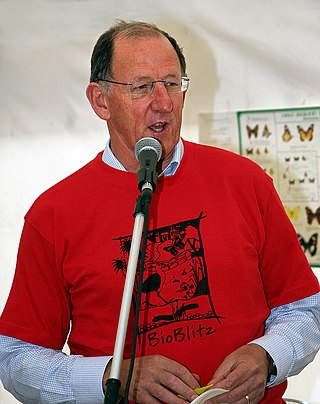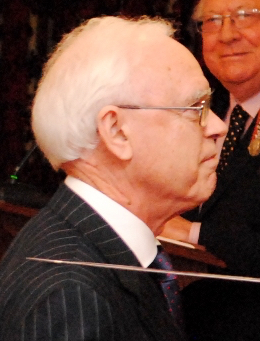
The economy of New Zealand is a highly developed free-market economy. It is the 52nd-largest national economy in the world when measured by nominal gross domestic product (GDP) and the 63rd-largest in the world when measured by purchasing power parity (PPP). New Zealand has one of the most globalised economies and depends greatly on international trade,mainly with China,Australia,the European Union,the United States,Japan and Korea. New Zealand's 1983 Closer Economic Relations agreement with Australia means that the economy aligns closely with that of Australia. Among OECD nations,New Zealand has a highly efficient and strong social security system;social expenditure stood at roughly 19.4% of GDP.

Dame Jennifer Mary Shipley is a New Zealand former politician who served as the 36th prime minister of New Zealand from 1997 to 1999. She was the first female prime minister of New Zealand,and the first woman to lead the National Party.
The Reserve Bank of New Zealand (RBNZ) is the central bank of New Zealand. It was established in 1934 and is currently constituted under the Reserve Bank of New Zealand Act 2021. The governor of the Reserve Bank,currently Adrian Orr,is responsible for New Zealand's currency and operating monetary policy.

ANZ Bank New Zealand Limited is a New Zealand banking and financial services company,which operates as a subsidiary of Australia and New Zealand Banking Group Limited of Australia. ANZ is one of New Zealand's big four banks,and is the largest bank in New Zealand with approximately 30% of market share as of March 2021.

Richard John Hubbard is a New Zealand businessman and politician,founder and former principal of Hubbard Foods in Auckland,and mayor of Auckland City from 2004 to 2007. He was elected mayor of Auckland City on 9 October 2004,succeeding John Banks,who in turn succeeded Hubbard as mayor on 13 October 2007.

Sir John Phillip Key is a New Zealand retired politician who served as the 38th prime minister of New Zealand from 2008 to 2016 and as leader of the National Party from 2006 to 2016.

Roger Lawrence Kerr,a public policy and business leader,was the executive director of the New Zealand Business Roundtable,a free-market think-tank based in Wellington,New Zealand.

Alan Esmond Bollard is a New Zealand economist and retired senior public servant. He was Secretary to the Treasury from 1998 to 2002,Governor of the Reserve Bank from 2002 to 2012,and executive director of the Asia Pacific Economic Cooperation (APEC) secretariat from 2013 to 2018.

Mount Albert Grammar School,commonly known as MAGS,is a co-educational state secondary school in Mount Albert in Auckland,New Zealand. It teaches students in year levels 9 to 13. As of August 2021,Mount Albert Grammar School is the second largest school in New Zealand,behind Rangitoto College.

Lieutenant General Sir Jeremiah Mateparae is a former New Zealand soldier who served as the 20th governor-general of New Zealand between 2011 and 2016,the second Māori person to hold the office,after Sir Paul Reeves. A former officer in the New Zealand Army,he was the Chief of the Defence Force from 2006 to 2011,and then served as the director of the New Zealand Government Communications Security Bureau for five months in 2011. Following his term as governor-general,Mateparae was the high commissioner of New Zealand to the United Kingdom between 2017 and 2020.

Sir Roderick Sheldon Deane is a New Zealand economist,public sector reformer,and businessman. He served as deputy governor of the Reserve Bank of New Zealand,and as CEO and chairman of the country's largest telecommunications company,Telecom New Zealand.

Iain Robert Rennie is a New Zealand economist and senior public servant. He was State Services Commissioner from 2008 to 2016 and has been Secretary to the Treasury since November 2024.

Robert Ian Fyfe is a New Zealand businessman and a former chief executive officer (CEO) of New Zealand national airline Air New Zealand.
New Zealand dollar banknotes are the banknotes in circulation in New Zealand,the Cook Islands,Tokelau,Niue and the Pitcairn Islands,denominated in the New Zealand dollar. They are issued by the Reserve Bank of New Zealand and since 1999 have been made of polymer.
Sir Alexander Ross was a New Zealand-born banker and rower who competed at the 1930 British Empire Games. He was a rowing selector for New Zealand's Olympic and Commonwealth teams,New Zealand team manager for the Vancouver Commonwealth Games and chairman of the Commonwealth Games Federation from 1968 to 1982.

Between May 2006 and the end of 2012 there were sixty-seven finance company collapses in New Zealand; including companies entering into liquidation,receivership or moratoria. An inquiry by the New Zealand Parliament estimated losses at over $3 billion that affected between 150,000 and 200,000 depositors. The most high-profile collapses were South Canterbury Finance,Hanover Finance and Bridgecorp Holdings. The collapse radically reduced the size and importance of the non-bank finance sector in New Zealand. According to the Reserve Bank,at the height of financial expansion prior to the 2007–2008 financial crisis,non-bank lenders had assets of about $25 billion and made up 8 percent of lending by financial institutions. By late 2013 the size of the finance sector was half its previous size and accounted for only 3 percent of institutional lending. In the years following the beginning of the collapses,sweeping legislative and regulatory changes were made,aimed at improving oversight and regulation of the finance industry.

Dame Patricia Lee Reddy is a New Zealand lawyer and businesswoman who served as the 21st governor-general of New Zealand from 2016 to 2021.

John Stewart Ombler is a New Zealand public servant. He served as deputy State Services Commissioner from 2008 until 2014,and briefly in 2019,and as the controller of the all-of-government response during the 2020 COVID-19 pandemic.

Caralee McLiesh is an Australian economist and senior public servant who is currently serving as the auditor-general for the Commonwealth of Australia. She was previously Chief Executive and Secretary to the New Zealand Treasury from 2019 to 2024.
Adrian Orr is a New Zealand economist and current Governor of the Reserve Bank of New Zealand.
















